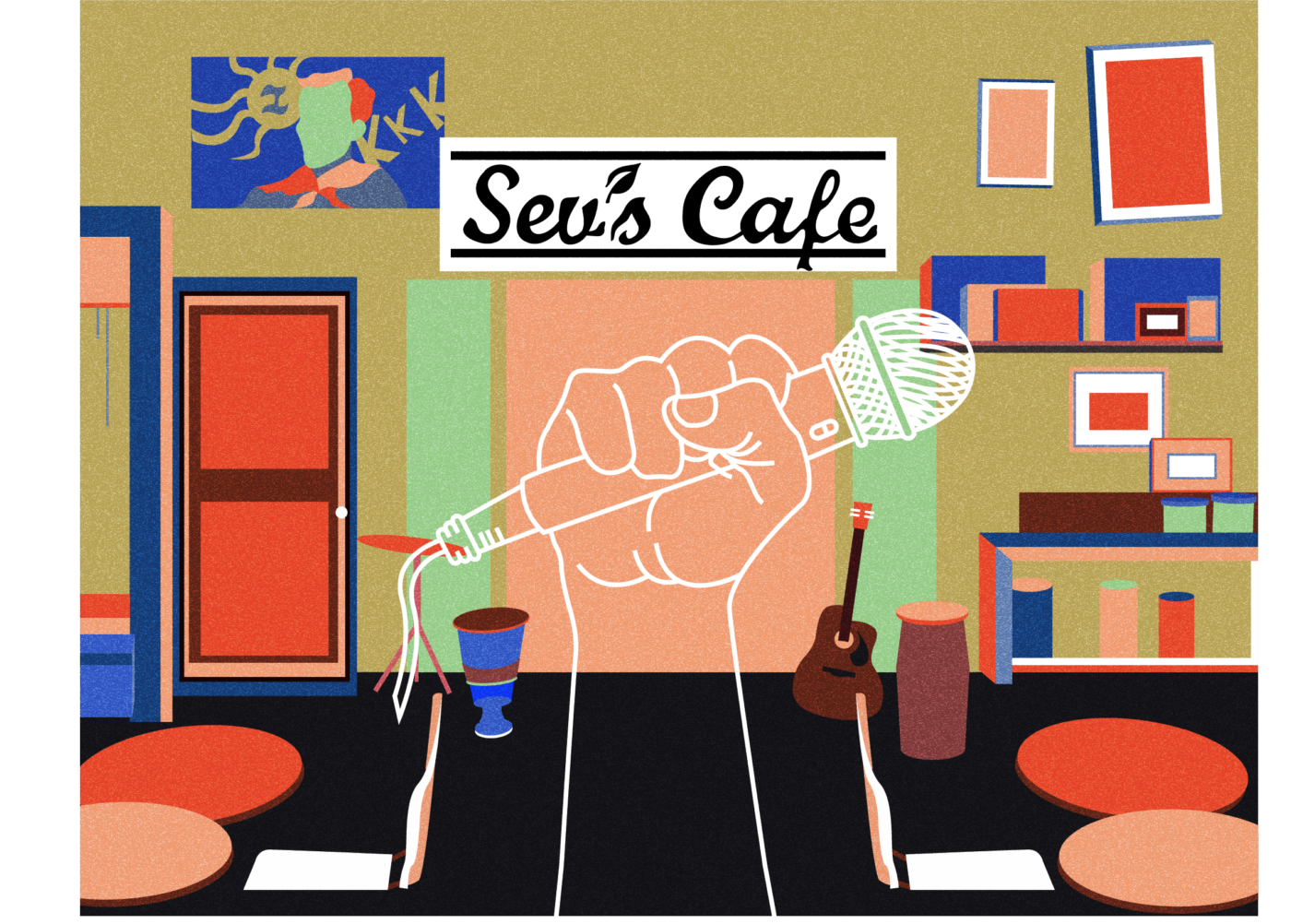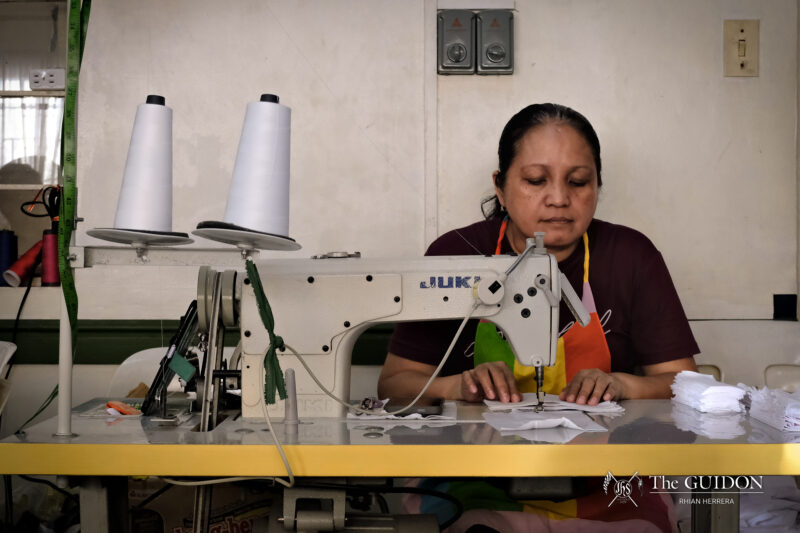The moment doesn’t begin with the poet on stage. It begins with the sign-up sheets, the soft hum of the music, and the warmth from the dimmed lights. Nothing is standard here, neither the professionalism nor the genre; at its core, one might imagine it to simply be a space where audiences can come as they are and find love poems of all kind, be it love for oneself, for a hobby, or maybe even for the country.
While the Ateneo could be considered a melting pot of culture, one can’t help but wonder if spoken word still has a place among its ever-changing art scene. What was once a tradition in places such as Sev’s Cafe and Roots Katipunan has grown quiet over the years, begging the questions: What does our silence say about us? And can spoken word poetry tell the story?
Tracing back roots
Spoken word is used as an umbrella term for poetry that is recited out loud, reliant on the impact of wordplay and intonation in favor of page aesthetics. Historically, the existence of Philippine folk literature is proof that the culture of storytelling has long since been embedded in our past. Pre-colonial Filipinos were known to use folk narratives, speeches, and songs to honor traditions and celebrate daily occurrences.
Outside the Philippines, poetry as a spoken art form in the United States can be traced to the early twentieth century. Poets such as Robert Frost and Vachel Lindsay maintained the popularity of spoken word until the 1960s, when it was influenced by the Harlem Renaissance and the Civil Rights Movement.
In Europe, spoken word was patterned with music; musicians incorporated spoken word lyrics over their beats, popularizing it in France and the United Kingdom. African countries began hosting Poetry Slam competitions on an annual or even monthly basis. Worldwide, clubs and cafes picked up on the hype of spoken art, birthing the concept of open mics.
Open mics, derived from the expression “open microphone,” are live shows where audience members can perform. Typically, interested performers are encouraged to sign up for a time slot pre-show, to be called up on stage by the host during the event proper.
Performative art
Today, spoken word is experiencing a renaissance. It’s hard not to recognize a familiar performance that made its rounds on social media about three years ago. A video of Juan Miguel Severo’s “Ang Huling Tula na Isusulat ko Para Sa’yo” during a UP Psychology Society (PsychSoc) talk on the psychology of hugot has garnered two million views and roughly 114,000 reacts since its debut on Facebook as of writing.
An influx of spoken word videos and pieces then began to flood different social media platforms, followed by a sudden increase of local open mics and slam poetry competitions.
Yet the spoken word scene differs from one city to another. In Katipunan, the occurrence of open mic nights usually depends on local groups and student organizations. These events, promoted on social media, usually drive amateur and veteran poets alike to perform.
Serge Gabriel (BS PSY ‘13) of spoken word collective Words Anonymous makes the point that spoken word in Katipunan is a little more “underground” than “street.” While restaurants such as Ella and the Blackbird and Route 196 have held open mics in the past, the scene in Katipunan is not as alive as that of Makati’s, or down further South. In addition, Gabriel is often invited by organizers to perform in these events, making the term “open mic” a bit of a misnomer.
The question, then, is not a lack of spaces. As Gabriel says, “It’s more of [asking], do we have a culture here in Katipunan that encourages open mic nights, specifically for that kind of thing [performing even without invitation]?”
Gwen Magdamit, a European studies junior who has delved into spoken word poetry in the past, shares the same sentiments. “I’m not aware of open mic events here in Katipunan, and I think spoken poetry isn’t really common [in the area] anymore.”
In the Philippines, musings about love are staples in open mic nights. According to Magdamit, “many performances had their own unique expression, delivery, and stories about relationships and love. [The performances] moved many [in] the audience.”
The affinity for performances about love is not present in many other countries. For instance, Gabriel shares how his performance of a love poem in the United States brought both shock and awe because the usual subject nature of their poetry tackles racism or depression. The cultural difference, Gabriel adds, is also visible in Germany, where spoken word poetry appears more like stand-up comedy because of how Germans, according to Gabriel, “forgot how to laugh” in a portion of their history.
For Magdamit, the allure of spoken word lies not only in its relatable subject matter but in the ability to share in an art form with her circle of friends. “Many of my high school friends were into spoken poetry… [we] were into it since many of us were into writing hugot pieces,” she said.
Furthermore, literature professor Oscar Campomanes, PhD shares the role of this art form in the lives of the youth, as he recalls how it allowed his students “to break bread and commune with perfect strangers, to overcome shyness and [be more gregarious]” aside from enabling them to realize their abilities in creating art and poetry.
Beyond the mic
With a storied past that stretches back to pre-colonial traditions, it is difficult to say what direction spoken word poetry will take. But as the art form evolves to fit the Filipino’s ever-changing context, it is certain that spoken word is here to stay.
Spoken word poetry, distinguished by its spontaneity and vitality, and independent of classroom interpretation, asserts its role in our global society as Campomanes shares, “it is the new universal language, and language-use, most enabling for the world’s citizens to overcome and transcend our linguistic and cultural, if not socio-political, differences.”
“Historically, as a people, we love passing on stories,” Gabriel shares. While the “love team culture” is dominant locally, Filipino poetry is not just about hugot or romantic love but also about love for freedom, justice, and country.
For instance, Jihad Mambuay tackles Islamophobia through his poems, such as “Kung Bakit Walang Nakakatawa sa Ligaw na Bala.” Through it, Mambuay challenges the humor behind laughing at Muslim stereotypes.
Similarly, Jonel Revistual brings to fore the plight of Filipino farmers. In his 2018 piece, “Isang Magsasaka, Dalawang Panginoon,” he confronts state violence against farmers, calling attention to how they receive gunshots in return for their work in the fields.
Today, segments of spoken word performances remain part of rallies. “When I go to rallies, there’s always going to be at least two or three people with a Martial Law poem,” shares Gabriel. “And I think that’s beautiful.”
Among them are RJ Carbonell, who performed a piece entitled “Ang Mahal kong Imelda” at the National Union of Journalists Black Friday Rally, and Juan Miguel Severo’s “Ang Teorya ng Paglikha.” Both poets made use of familiar Filipino references to narrate the lasting repercussions and effects of the Martial Law regime, crushing the stigma that spoken word poetry is confined to the box of hugot culture.
In the future, the need to tell a story will only continue to drive Filipinos to pour their hearts out on stage. “I feel like people just really, really [want to] hear a good story,” says Gabriel. “Apart from hearing it, people just [want to] tell a good one also.”
Illustration by Katharine D. Garica







